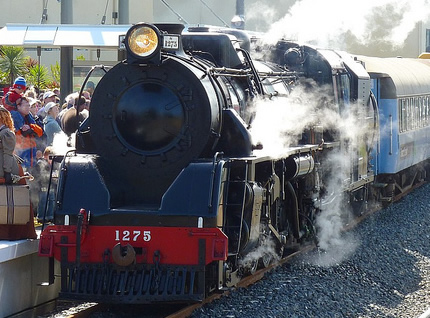The Campaign For Better Transport appeared before the Board of Inquiry for the Waterview motorway project. A copy of our representation is here, but key sections are:
The CBT remains opposed to the project in its current form, as we consider it does not contribute to a more sustainable transport future for Auckland.
We also consider that many of the project’s supposed benefits have not been proven by NZTA’s evidence. Therefore, under section 5 of the RMA the ‘balancing act’ – outlined succinctly in paragraph 103 of NZTA’s legal submissions – has not been sufficiently met.
Furthermore, none of the supposed benefits have been evaluated in the context of rising fuel prices. Consideration of project risk is completely absent from NZTA’s evidence.
The current escalating petrol prices are a real risk to the economic viability of the project in our opinion:
The rebuttal evidence of Mr Tommy Parker, on behalf of NZTA, notes that the project’s ‘cost-benefit ratio’ (BCR) varies, according to the transport model used and whether or not wider economic benefits are included or not (paragraphs 36-40). Under the ART2 model the project enjoyed a BCR of 2.1: that is, the $2 billion invested in the project was estimated to generate $4.2 billion of economic benefits (mainly in the form of travel time savings) over the lifespan of the project.
However, in April 2010 the (supposedly new and updated) ART3 model was used to analyse the benefits of the project, and its BCR reduced to 1.2. That is, for the $2 billion spent on the project, the economic return was now only calculated to be $2.4 billion. It is unclear what happened to the other $1.4 billion in benefits, whether they ever existed or not. Nowhere in NZTA’s evidence, to the CBT’s knowledge, is this issue fully examined…
While the NZTA may have come up with an arbitrary BCR value to aid guidance of project options, it has conducted no risk assessment, which would be standard practice in the commercial world when considering a $2bn investment.
Since we made our submission in October of last year, petrol prices have risen from $1.82 per litre to $2.16 today. Based on the experience of 2008, this will lead to reduced private vehicle trips and increased pressure on the public transportation system.
Given that there is a statistical base for modelling the effect of petrol price increases, we find it negligent of NZTA not to produce risk scenarios for petrol prices of $2.50, $3.00 or even $5.00 a litre. There must surely be a price level where the project is no longer economically justified, and we put it to the Board that consent for the project should only be granted once this price level is known.
We conclude:
The CBT considers there are fundamental questions about the project’s justification that remain unanswered. However, we seek to narrow the matters outlined in our submission down to three particular matters:
– That NZTA should be required to conduct a risk analysis for the project with regard to the price of fuel, and determine the price level where the project no longer becomes economically viable. This will help inform the Board to make an assessment on the likelihood of that price level being reached.
– Should approval be granted, that NZTA should be required to construct (potentially in conjunction with Auckland Transport) a cycleway between SH20 and SH16, above the tunnel section of the project.
– Should approval be granted, that two additional transport related conditions be applied to the consent. These are as follows:
- That NZTA be required to undertake an “audit” of the project’s benefits at various dates post-construction to help inform the economic justification of future transport projects.
- That NZTA be required to work with Auckland Transport to find constructive ways of improving bus, cycling and walking infrastructure along main arterial routes that will experience reductions in traffic numbers as a result of the project, to ensure the project generates ‘modal choice’ and to ensure the traffic reduction benefits are ‘locked in’.

